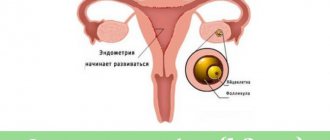Hormones are regulators of all systems and organs of the body. In women, the functional state of the endocrine glands primarily determines reproductive health. All hormones influence each other, so a failure in the production of one of them leads to the development of other hormonal disorders. Therefore, it is so important to identify and correct the disease in a timely manner. First of all, disruption of the production of sex hormones affects the menstrual cycle. Endocrine diseases often cannot be completely cured, but an adequate quality of life can be restored and normal well-being can be restored with the help of medications.
There are usually two reasons for disruption of hormone production: congenital disorders that are established in utero and appear at a certain stage of life, or acquired. The second category includes, in particular, the consequences of taking pharmaceutical hormonal drugs.
The possibility of complete restoration of the endocrine system and other body systems depends on the severity of the disorders and their causes. At the moment, for almost all hormonal diseases, there are effective treatment regimens that allow you to get rid of unpleasant symptoms - but before selecting treatment, you will have to undergo a full diagnosis and establish the cause of the disorder.
Norm and pathology
Hormonal imbalance can occur at any age. According to statistics, teenage girls and women in the premenopausal period most often experience problems. This is understandable - at these moments serious changes occur in the endocrine and reproductive systems.
Hormones are produced in the endocrine glands: pituitary gland, hypothalamus, thyroid gland, adrenal glands, ovaries, pancreas. Let's look at the main hormones that affect reproductive function:
- Estrogens are a whole group of biologically active substances that are produced in large quantities in the first phase of the menstrual cycle.
- Prolactin is responsible for breastfeeding, its concentration increases with the appearance of milk. Prolactin reduces the concentration of estrogen and slows down ovulation - thus, it protects the body from pregnancy while breastfeeding.
- Follicle-stimulating hormone - responsible for the growth of follicles in the ovaries. Produced at the beginning of the menstrual cycle.
- Luteinizing hormone - increases the rate of estrogen synthesis and is responsible for the release of a mature egg from the follicle capsule.
- Progesterone - produced during ovulation, is responsible for the formation of the corpus luteum. Its concentration increases significantly during pregnancy.
- Testosterone - despite the fact that it is a male sex hormone, it is also present in the female body. Performs an important function during pregnancy - it stimulates the enlargement of the mammary glands.
Together, these substances regulate the menstrual cycle and affect the possibility of conception. Together with them, but to a lesser extent, reproductive health is also regulated by other hormones of the endocrine system - they are in close relationship. As a rule, a disruption in the production of one hormone provokes secondary changes, and as a result, a complex hormonal imbalance occurs.
The functional state of the reproductive system directly affects the production of hormones. For example, in adulthood, when a woman’s supply of eggs runs out, a restructuring of the hormonal system occurs - the ability to bear children disappears, and menstruation disappears. During puberty, on the contrary, the body's systems prepare to perform the reproductive function.
During such periods, the line between normal and pathological is arbitrary - unpleasant symptoms may appear, which will disappear after some time. If you have doubts about your own health, it is better to consult a specialist. Between the ages of 18 and 45, hormonal levels are considered fairly stable. If unpleasant symptoms appear during this period, a visit to the doctor is definitely required.
At CELT you can consult an endocrinologist.
- Initial consultation – 3,500
- Repeated consultation – 2,300
Make an appointment
Symptoms in adults and adolescents
The symptoms of the disorder depend on the age of the patient and the cause of the disease. During reproductive age, women complain of the following:
- increased pain during menstruation;
- menstrual disorder in the form of delay or complete cessation of menstruation;
- increased PMS phenomena;
- decreased libido;
- increased hair growth on the body and face;
- the presence of acne, constant foci of inflammation on the skin;
- sleep disorders;
- Strong headache;
- frequent mood changes for no apparent reason;
- irritability, increased aggressiveness directed towards others;
- The amount of vaginal lubrication decreases, which is why a woman feels discomfort during sexual intercourse.
This situation requires contacting a doctor and correcting the condition. In adolescent patients, this failure has other manifestations. This is due to the beginning of the establishment of hormonal levels characteristic of an adult woman. It manifests itself with the following symptoms:
- lack of hair growth in the pubis and armpits;
- the rate of formation of mammary glands is reduced;
- Menarche did not occur before age 17;
- Irregularity of the cycle persists for more than a year after the first menstruation.
A sharp weight gain or a pronounced lack of weight in a girl is often a sign of hormonal imbalance.
Causes of pathology
Globally, all causes are divided into congenital and acquired during life.
The most common causes of hormonal imbalance in women:
- Consequences of taking oral contraceptives. Controversy continues around these drugs. Most gynecologists are confident in their safety, but only if the appointment is carried out after consultation and under the supervision of a specialist. Most often, violations appear after incorrect withdrawal of pills.
- Consequences of taking emergency contraception. These drugs greatly change hormonal levels, resulting in menstrual irregularities, which do not always recover on their own.
- Uncontrolled use of drugs containing hormones without appropriate prescription. Unfortunately, some patients neglect to consult a specialist and start taking medications purchased without a prescription. The consequences are the development of hormonal disorders.
- Diseases of the endocrine system. They lead to a failure in the production of essential hormones.
- Physiological changes during puberty and adulthood. Against the background of hormonal changes, hidden pathologies often appear.
- Abortion. This is a strong stress for the body, in which physiological restructuring has begun, and it is immediately interrupted. The body does not always manage to restore the natural functioning of the endocrine glands.
- Prolonged stress is also one of the most common causes. It has been proven that stress, anxiety and depression are associated with a decrease in the production of oxytocin, which, in turn, affects the synthesis of prolactin.
Pregnancy is also considered a hormonal imbalance - but it is physiological. If the pregnancy proceeds normally from the point of view of the vital signs of the mother and child, then various unpleasant symptoms are allowed - they are not dangerous to the health of the mother and child.
Treatment
To correct hormonal levels, women are prescribed hormone therapy under the strict supervision of a doctor. In addition, the following measures are taken to eliminate the causes of the disease:
- treatment of inflammatory pathologies of the genital area and STDs;
- therapy of extragenital diseases of organs and systems that affect hormonal regulation;
- conducting rational psychotherapy.
If conservative treatment is ineffective, surgical interventions are used to correct the condition. Women have hormone-dependent tumors removed and other necessary operations performed.
In addition to drug therapy, it is important for patients to adhere to the recommended regimen of activity and rest. They need feasible physical activity and sufficient sleep. It is necessary to adhere to proper nutrition.
It is important for women to consult a doctor in a timely manner and not attribute the symptoms of the disease to excessive workload and fatigue. It is important not to self-medicate, but to consult a medical doctor.
Symptoms of pathology
Symptoms of hormonal imbalance may vary depending on the nature of the disorder, in particular:
- changes in the duration and regularity of the menstrual cycle;
- intermenstrual bleeding;
- hair growth disorder;
- nipple discharge;
- emotional lability;
- change in sexual activity;
- change in appetite;
- weight disorders.
The appearance of these symptoms is a reason to make an appointment with an endocrinologist.
Treatment and restoration of hormonal levels in women
After identifying the causes of hormonal transformations, appropriate treatment is selected based on the diagnostic results. The main method is hormone therapy. A hormone-containing medication is prescribed, depending on which hormone level needs to be adjusted. When the failure is eliminated, its consequences will gradually go away completely if they are functional (reversible) in nature. If the changes are organic, then long-term therapy will most likely be required, depending on the extent of the damage.
In some cases, treatment is not required. For example, if a person worked too hard at work, experienced stress, and did not get enough sleep for several nights in a row. Then it is enough to step away from work for a short time, change the environment (it is best to go to a sanatorium), and establish a regime of rest and activity. The human body is capable of self-healing if provoking factors are removed and favorable conditions are created for recovery. In this case, it won’t hurt to drink a vitamin-mineral complex to strengthen your immune system.
If you periodically take such courses, rest normally, do not put the nervous and other systems into “default”, and do not wait for somatic or psychological abnormalities to appear, then you can avoid relapses. If no measures are taken, then functional hormonal disorders will become organic, and they will have to be dealt with for a long time and in other ways. And most importantly, organic matter is irreversible; it will only be possible to maintain the functioning of the damaged organ.
In the premenopausal period, hormone replacement therapy is prescribed to normalize and support menstrual function. This is extremely important, the longer a woman menstruates, the better her overall health, well-being, activity, performance, and the aging process will slow down.
Our doctors
Mikhailova Elena Vladimirovna
Endocrinologist, diabetologist, candidate of medical sciences
Experience 46 years
Make an appointment
Slovesnova Tatyana Alekseevna
Endocrinologist, Candidate of Medical Sciences, doctor of the highest category
Experience 48 years
Make an appointment
Kolodko Inna Mikhailovna
Doctor - endocrinologist, doctor of the highest category
Experience 26 years
Make an appointment
Pregnancy and hormone imbalance
Symptoms of hormonal imbalance during pregnancy are subtle. As a rule, the doctor notices them first. Therefore, it is important to regularly visit a gynecologist and not refuse preventive examinations.
There are manifestations that are difficult to notice immediately:
- change in endometrial thickness;
- development of fibroids;
- pathology of follicle maturation;
- disruption of hormone production: lack of progesterone and estrogen, excess testosterone.
After conception, a whole cascade of changes begins in the body. With sufficient medical control, almost all pregnancy pathologies can be corrected and do not lead to serious consequences.
Diagnostics
Diagnostics includes both instrumental examinations and laboratory tests. The examination begins with a visit to a therapist or a specialist - a gynecologist or endocrinologist. Often the pathology is complex, so treatment will have to be done by several doctors.
Instrumental diagnostics includes:
- Ultrasound of the thyroid gland and pelvic organs, as well as mammary glands. This study is carried out for any complaints with symptoms of hormonal imbalance. In most cases, ultrasound can reveal which gland the pathology is associated with.
- MRI may be required if anatomical changes are detected and further diagnostics are required.
Laboratory tests include blood tests for hormones. The attending physician decides which hormones need to be determined, based on the nature of the complaints and examination data. As a rule, there are no problems with diagnostics - modern analysis methods are quite accurate.
Symptoms and diagnosis of endocrine diseases
Endocrine disorders are numerous, and their development and symptomatic picture are often unpredictable. The system for regulating the activity of internal organs performs an important function, ensuring the production of special substances - hormones. Often a malfunction occurs in the operation of this system, leading to the development of pathologies and diseases.
An endocrinologist is involved in identifying the causes and diagnosing diseases. After consultation and examination of the body, the doctor determines how the disease progresses and what treatment methods are relevant for a particular patient.
Qualified doctors from Novocherkassk and the Rostov region receive consultations at the Women's Health Center "Femina". Make an appointment by calling 8 8635 29 15 16.
List of major endocrine disorders
The function of hormones is of great importance for the physical, mental and physiological state of a person. Failure in the functioning of endocrine organs leads to the development of pathological processes that are accompanied by changes in the hormonal system:
- disruption of production - decrease or increase;
- slower transport and absorption;
- abnormal structure;
- resistance against hormonal action increases.
Such processes affect all internal human organs, including the nervous system, leading to the development of various diseases.
Major endocrine system disorders:
| Disease | Reasons for development | Symptoms |
| Hypothyroidism | Production of low levels of hormones, leading to hypofunction of the thyroid gland | Decreased metabolic processes, slow heart rate, constipation, menstrual irregularities. The primary stage occurs with severe fatigue. Women are most susceptible to the disease - the disease is diagnosed 18 times more often than in men. |
| Diabetes | Complete or partial lack of insulin in the body, leading to metabolic dysfunction | Constant feeling of thirst, increased appetite, frequent urination, changes in the skin. |
| Goiter | Hypo- or hyperfunction of the thyroid gland occurs due to insufficient iodine intake | Accompanied by an enlarged thyroid gland. |
| Thyrotoxicosis | Increase in T3 and T4 hormones in the blood | A sharp decrease in body weight, acceleration or failure of the heart rate, increased sweating, irritability, nervousness |
| Autoimmune thyroiditis | Inflammation of the thyroid tissue, developing against the background of decreased immunity | Depression, excessive fatigue, dry skin, brittle nails, menstrual irregularities, decreased libido, weight gain of 10 kg or more. |
| Hypoparathyroidism | Insufficient production of PTH, parathyrin and parathyroid hormone, which affect metabolism. Often the disease develops after surgery. | Seizures, numbness and chills of the extremities, hot flashes, sensation of muscle spasms. |
| Hyperparathyroidism | Increased secretion of parathyroid hormone, accompanied by impaired metabolism of microelements | Emotional imbalance, “duck” gait, fatigue during normal physical activity, earthy-gray skin color. |
| Gigantism | Chronic excess of somatotropic hormone (GH). Typically transmitted genetically | Diagnosed only in adults. Accompanied by disproportionate growth of bone, cartilage, soft tissues, as well as internal organs. |
Signs and methods for diagnosing endocrine diseases
The endocrine system consists of different endocrine glands; diseases also have a wide range of clinical manifestations. People often attribute the first signs of these diseases to fatigue after work or physical labor, stress, or overeating. In this case, the disease progresses, and damage to the endocrine gland becomes chronic.
General signs of endocrine diseases:
- increased fatigue during normal physical activity;
- weakness, muscle spasms;
- sudden weight loss or gain;
- fast or slow heartbeat, pain;
- feverish condition;
- increased sweating;
- excessive, unnatural excitability or, conversely, drowsiness;
- frequent urge to urinate is an indirect symptom, each patient has his own norm;
- constant thirst;
- high blood pressure with headaches;
- decreased memory function;
- regular occurrence of constipation or diarrhea.
In case of such a clinical picture, it is necessary to contact an endocrinologist. The following additional examination methods are used:
- MRI;
- CT;
- radiography of the skull;
- Ultrasound.
Laboratory research:
- blood test for sugar levels;
- blood biochemistry;
- glycosylated hemoglobin;
- glucose test;
- blood and urine test for hormones.
A detailed examination of the body will make it possible to diagnose the disease at the first stage, leveling out the pathology. You can make an appointment with an endocrinologist in Novocherkassk online on the Femina MC website.
Manifestation and diagnosis of endocrine diseases in ophthalmopathy
Signs of endocrine disorders in ophthalmopathy are caused by the presence of pathology in the thyroid gland. This leads to an expansion of the list of characteristic manifestations:
- upward lifting of the eyelid, swelling;
- feeling of pressure and pain on the eyeball;
- dryness of the mucous membrane of the eye;
- failure to perceive colors;
- exophthalmos;
- conjunctivitis;
- limited movement of the eyeballs;
- rare blinking;
- trembling and pigmentation of the eyelids.
Most cases do not lead to complete loss of vision function, but can cause vision loss, corneal damage, double image, and neuropathy.
If the clinical picture of the disease is pronounced, then a standard examination by an ophthalmologist is sufficient. The study included analysis of color vision and eye movement, optical media and perimetry. In unclear cases, ultrasound, MRI and CT are required.







